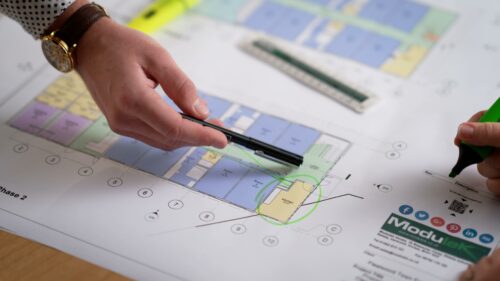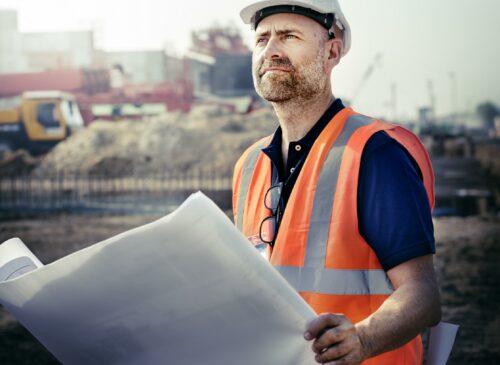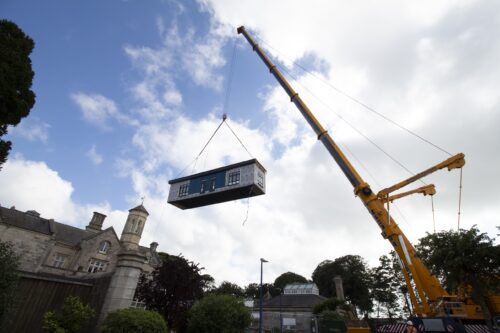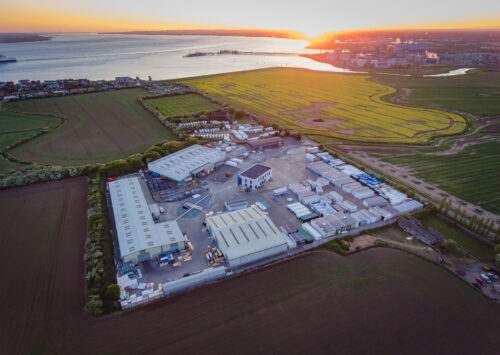Why Modular Construction?
Modular buildings are widening the parameters of what’s possible in the construction industry. Able to be completed at a faster rate than traditional builds – all whilst producing less waste and less greenhouse gases– modular construction is making the necessary modifications we need for the future of our towns and cities accessible and achievable.
Modular methods don’t require you to sacrifice on the quality of materials and design in order to be the most efficient and sustainable way of modern building. By nature, it encourages design innovation, forward-thinking energy solutions, and the use of environmentally friendly materials that are built to last.
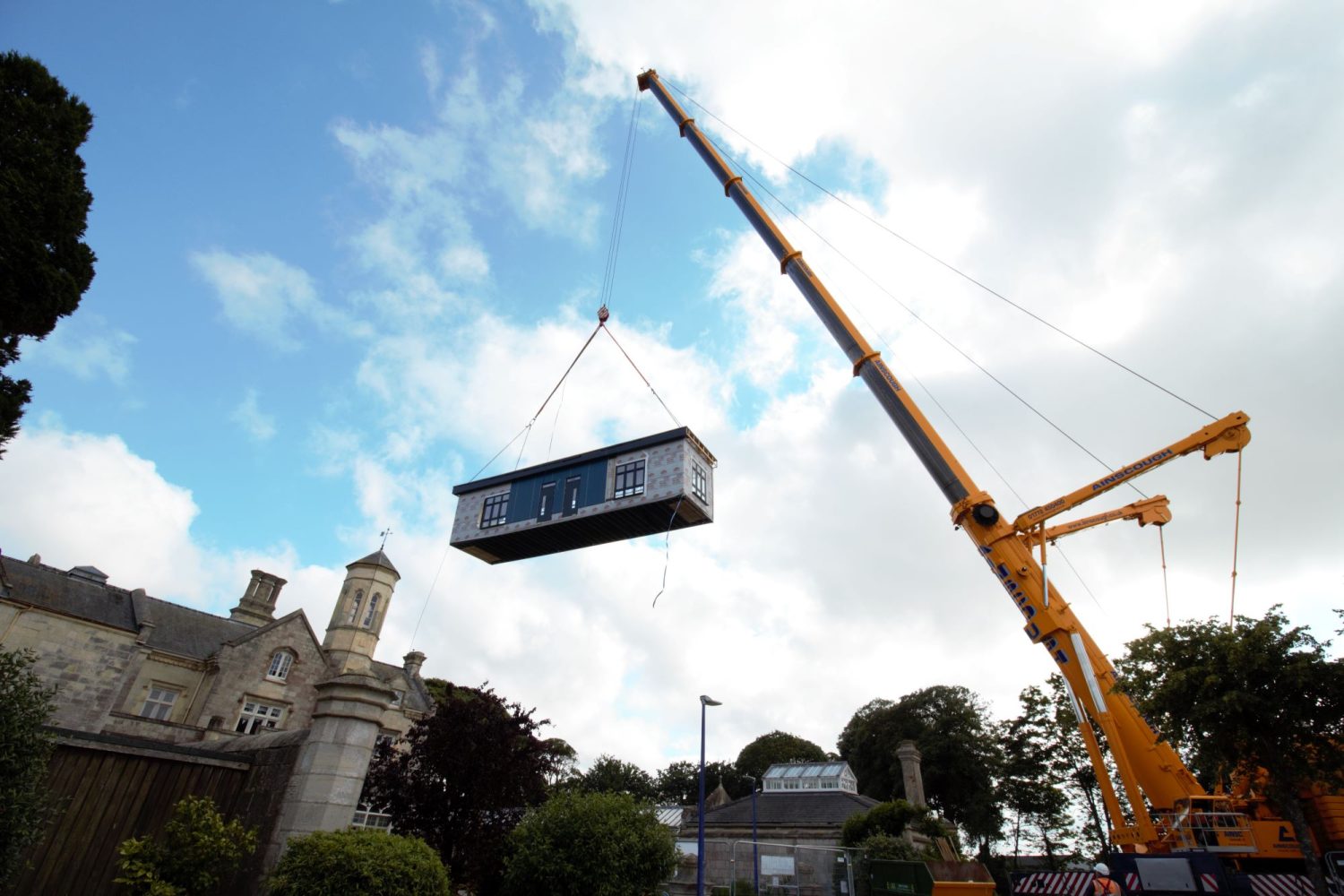
What is modular construction?
Modular construction is constructing a structure in sections, or modules. The modules are built off-site in a controlled factory environment, and transported to the final construction site and assembled.
Understand the modular construction process from design to finished building with this timelines animation.
The process is akin to assembling building blocks, where each module serves a specific purpose and contributes to the overall functionality of the structure. It’s a method that is particularly popular in commercial and residential construction, as it allows for a more streamlined and predictable construction process.
Modular construction can be compared to traditional construction. In traditional construction, most work takes place on-site.
See an example of the offsite and onsite construction in video of Hamble Yacht Services.
Benefits
The benefits of modular construction stem from the controlled factory construction environment. For example:
- reduced susceptibility to weather and other delay factors
- reduced on-site labour requirements for a safer more predictable work process
- parallel on-site and off-site work results in accelerated timetable
- minimised material waste which is better aligned with sustainable building practices
- enhanced quality control thanks to the ability to achieve a high degree of precision in manufacturing
In essence, modular building systems combine innovation and practicality to offer a contemporary solution to the challenges of traditional construction, providing a faster, more cost-effective, and environmentally conscious approach to building.
Examples of modular construction
Modulek are modular construction experts who deliver quality, large, and high-end specification new buildings every year.
If you are interested in working with us, let’s talk.
Reasons for the widespread adoption of modular construction
1. Speed
Off-site construction accounts for 70% of the total build, which allows the production of the building to commence at the same time as the groundwork. This enables the project to run the two phases in parallel, resulting in the delivery of the almost-complete building as soon as the groundwork is complete.
2. Reliability
Furthermore, as the majority of the project is constructed in factory-controlled environments, the obstacle of tricky weather conditions, and being unable to secure trades within a certain construction window, are reduced significantly. With fewer risk factors at play, a client can expect the final build to come together in a much shorter time frame.
3. Sustainability
Advanced precision engineering techniques in the off-site production process are designed to produce significantly less waste materials. Delivering the modular units to the site whole reduces the amount of deliveries, and number of trucks on the local roads, cutting CO2 emissions of the project.
4. Versatility
Modular buildings have a proven track record of delivering successful projects to the education, sports & leisure, health and MOD sectors, all delivered exactly on time and within budget.
Sound appealing? Learn more about the benefits
Benefits of Modular BuildingsHistory of modular construction
Modular building construction isn’t a new conception, but it has undergone a number of significant innovative developments to ensure this method will continue to adapt to our needs well into the future.
Many will know the prefabrication (“prefab”) public housing initiative of post-war Britain to address the UK’s housing shortage after the Second World War. 156,000 prefab homes were built between 1945 and 1959, but were only envisaged to last 10 years, whilst the country replenished their resources for traditional builds to replace them.
Modular methods are not prefab, and have undergone radical changes since 1945. Inspired by the potential of the prefab initiative, modular building has received a new wave of attention from some of the finest minds, and investors, in the construction industry. Now, the method incorporates a fresh focus on longevity, using modern technologies and a variety of smart materials to make the vision a reality.
Find out more about the modern methods of construction that are reshaping the way we build.
How is modular construction making an impact?
In areas such as Japan and Scandinavia, the potential of prefab was recognised early and developed, cementing modular methods into their market’s development industry. However, European countries, the UK, and the US have been slow to catch up, despite its potential for profound positive impact on the construction industry, and society as a whole.
Affordable housing
Across the UK, as in many other countries around Europe and the US, we are facing a crisis; the lack of affordable and sustainable housing. Modular building construction presents a solution that ticks all the boxes; it can provide quality housing quickly, efficiently, and cost-effectively, and has the potential to redefine the industry standard of ‘liveable’.
Hospitality and leisure
Flexible and easily customisable, modules can be combined in a variety of ways to create unique designs and innovative space solutions. This is perfect for architects and inner city planners designing leisure districts, who won’t need to sacrifice aesthetics and character for utility, affordability, and longevity.
Public sector
One sector already benefiting from modular construction methods is Education. Modular methods are often used in the education sector, favoured for their faster build-times and low cost, providing temporary or permanent classrooms, specialist subject blocks and libraries, and a host of other functional learning spaces.
Workers’ saftey
Fatal accidents in the UK’s construction industry have risen by almost 10% in the past 5 years, with 30 deaths in recorded in 2021/22, and approximately 64,000 workers sustaining non-fatal injuries per year. The controlled indoor construction environment at the backbone of modular construction greatly reduces the risk of accidents, so workers can perform their trade safely.
The modern revolution of construction
The capabilities of modular building are forecast to continue developing as the years roll on, motivated by rapidly advancing technologies, an ever-growing population, and a laser focus on the climate emergency.
For more information about modular construction, and how it could carry your business, school, or community into the future, get in touch with one of our Senior Consultants today.
If you want further information about what modular construction offers, download our brochure.
Brochures




